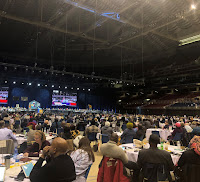God has strewn beauty all over the place, but we neglect it: we hurry
right by and don’t notice, or we have forgotten to name it when we see it. A
dandelion, a carefully arranged place setting, an old photograph, the tree in
your yard, a wrinkled face, clouds, a tune, a historical moment, commitments,
the face in the mirror: beauty is all around, waiting to be noticed, cherished,
pointed to, shared. And all of it reveals God’s heart to us. Want to see God? “Every experience of beauty points to
infinity” (Hans Urs von Balthasar).
How
good of God to stir so much beauty into the mix when God created everything! It
could have been all dirt, rock, efficiency, productivity. God, like the artist,
created what was unnecessary, inefficient. Why did God not only leave space for
beauty, but elevate it to its status as the one thing that thrills the heart
and leaves us feeling noble, giving immense dignity to the smallest creature?
St. Thomas Aquinas’s answer? “God created
the universe to make it beautiful for himself by reflecting his own beauty.”
God is a great many things – but at the center of it all, God is beauty. Ours
is to notice, to be awed, to be delighted.
We’ve all heard that “Beauty is in the eye
of the beholder,” but it’s a lie. It’s not a matter of taste, or private preference.
When we shrink things down to a private, opinionated list of what I like or
don’t like, we’re the losers. As we explore Beauty, we’ll learn to see better,
to see what God sees: every person, every thing, pretty or glitzy or not,
partakes in the goodness and beauty of God. We’re surrounded in it.
Sure, beauty also gets twisted and
perverted, and there’s so much desecration. Isn’t most ugliness really beauty
that’s gotten scared or fallen on hard times? And aren’t we adept at pinpointing
what’s ugly when there’s actually beauty there? For instance, there is a beauty
in suffering. You may know this from experience… Or the stunning array of
colorful leaves in Autumn: what you’re looking at is death.
Faith isn’t merely a belief God exists, or access to help when you’re in trouble, or your calling card to get into heaven. Faith is seeing as God sees. It’s a readiness to be astonished. It’s inefficient and unproductive, this pondering of beauty – and so it’s like prayer, a wasting of time, and yet what we crave deep in our souls. Nothing else really will satisfy.
Paul, from a dark, dank stone prison, wrote, “Whatever is noble, whatever is beautiful, whatever is admirable – if anything is excellent or praiseworthy – think about these things” (Philippians 4:8). God has strewn beauty all over the place. The least we can do is notice. Maybe we will become what we see.
I'm beginning a months-long project on Beauty. Through Facebook (with a special page if you’re in Charlotte) and Instagram I'll be posting stories, photos, quotes and more. I'd love for you to Email me pictures or stories. Not thinking "pretty" or even "attractive" but "beautiful," which may be surprising, subtle, humble, even dark. We have some great programs lined up, with former Mayor Harvey Gantt (Jan. 7), Jeremy Begbie of Cambridge and Duke, Ray Barfield, doctor and theologian, and Chas Fagan, sculptor and painter.






















.jpg)